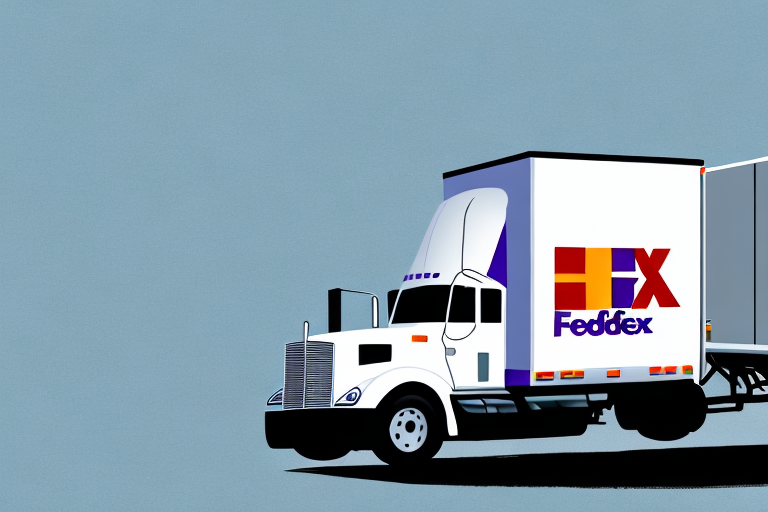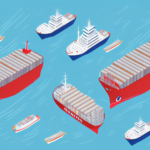Understanding FedEx Full Truckload Shipping Rates
Are you looking to ship a significant amount of goods or freight? If so, you may be considering FedEx Full Truckload Shipping. This service is designed for businesses that need to move a substantial amount of freight or cargo efficiently. In this article, we’ll delve into what full truckload shipping entails, the advantages of using FedEx's service, factors influencing shipping rates, how to calculate these rates, strategies to reduce costs, the types of trucks employed, selecting the appropriate service level, the significance of accurate weight and dimensions, and what to expect during the shipping process. Finally, we'll address common challenges and strategies to overcome them. Let’s begin by exploring what full truckload shipping involves.
What is FedEx Full Truckload Shipping?
FedEx Full Truckload Shipping is a service that involves booking an entire truck for transporting goods or freight. This service is ideal for businesses that need to move large shipments that exceed the capacity of LTL (Less Than Truckload) shipments. When you opt for full truckload shipping, your cargo is loaded onto a trailer and transported directly to the destination without any intermediate handling or reloading, ensuring a seamless journey. According to FedEx's 2023 logistics report, this method enhances efficiency and reliability for large-scale shipments.
One of the primary benefits of using FedEx Full Truckload Shipping is the enhanced security of your shipment. Since your goods are not subjected to multiple handling points, the risk of damage or loss is significantly reduced. Additionally, FedEx offers real-time tracking for your shipments, providing peace of mind and better planning capabilities. This ensures that your large shipments arrive safely and on time.
Advantages of Full Truckload Shipping
There are several key benefits to using FedEx Full Truckload Shipping for your freight needs:
- Reduced Transit Time: Direct transportation minimizes delays, resulting in shorter transit times compared to LTL shipping.
- Lower Risk of Damage: With only one loading and unloading event, the likelihood of damage to your goods decreases.
- Cost-Effective for Large Shipments: For substantial volumes, full truckload shipping can be more economical than multiple LTL shipments.
- Flexible Scheduling: Greater control over pickup and delivery times allows for optimized logistics planning.
Moreover, full truckload shipping can be more environmentally sustainable. Utilizing the entire capacity of the truck reduces the number of trips required, thereby decreasing the carbon footprint associated with transportation. According to the Environmental Protection Agency (EPA), optimizing truckload capacity can lead to significant reductions in greenhouse gas emissions.
Another advantage is the increased security for your freight. Fewer stops and transfers mean less exposure to potential theft or loss, making it an ideal choice for high-value or sensitive shipments.
Factors That Affect FedEx Full Truckload Shipping Rates
Several factors influence the shipping rates for full truckload services:
- Distance: The total miles between the pickup and delivery locations play a significant role in determining costs.
- Weight and Dimensions: Heavier and larger shipments require more resources, impacting the rate.
- Value of Goods: High-value items may incur higher insurance and security costs.
- Type of Truck: Specialized equipment, such as refrigerated or flatbed trucks, can affect pricing.
- Service Level: Expedited or guaranteed delivery services typically cost more.
- Seasonal Demand: Rates may fluctuate based on demand variations throughout the year.
Additionally, the nature of the goods being shipped can influence rates. Items that require special handling, such as hazardous materials, oversized items, or fragile goods, may incur additional fees. Geographic factors, such as shipping to remote or hard-to-reach areas, can also affect overall costs.
How to Calculate FedEx Full Truckload Shipping Rates
Calculating FedEx Full Truckload Shipping rates involves considering several components:
- Distance: Total miles of the shipment route.
- Weight and Dimensions: Accurate measurements are crucial for precise cost estimation.
- Service Type: Standard, expedited, or guaranteed services will affect the rate.
- Special Requirements: Additional services like refrigeration or oversized handling add to the cost.
FedEx provides online calculators on their website to help estimate shipping costs. Alternatively, contacting a FedEx representative can provide a customized quote based on your specific needs.
It's important to note that rates may vary during peak seasons due to increased demand. Planning shipments in advance can help mitigate potential cost increases.
Tips for Reducing Full Truckload Shipping Costs
Implementing the following strategies can help lower your full truckload shipping expenses:
- Consolidate Shipments: Combine smaller shipments into a single large shipment to maximize truck capacity.
- Ensure Accurate Weight and Dimensions: Precise measurements prevent unexpected additional charges.
- Flexible Scheduling: Flexible pickup and delivery times can lead to cost savings.
- Plan Ahead: Early booking can secure better rates and availability.
Negotiating rates and terms with carriers can also result in significant savings. Building strong relationships with shipping partners may provide access to discounts and special offers. Additionally, exploring intermodal transportation options, which combine different modes of transport such as trucks, trains, and ships, can offer cost-effective solutions for long-distance shipping.
Different Types of Trucks Used in FedEx Full Truckload Shipping
FedEx Full Truckload Shipping utilizes a variety of trucks to accommodate different types of cargo:
- Flatbed Trucks: Ideal for freight that requires open-space transportation and can be loaded from the sides and top.
- Refrigerated Trucks: Suitable for temperature-sensitive goods like food and pharmaceuticals.
- Dry Van Trucks: Used for the general transport of non-temperature-sensitive items such as clothing and equipment.
For oversized or overweight cargo, FedEx offers specialized equipment:
- Lowboy Trailers: Designed for heavy machinery and construction equipment.
- Step Deck Trailers: Accommodate cargo that exceeds standard height limits.
- Double Drop Trailers: Handle exceptionally tall or lengthy shipments.
This range of equipment ensures that FedEx can handle any type of cargo, regardless of size or weight.
Understanding the Role of Freight Class in FedEx Full Truckload Shipping Rates
The freight class of your shipment significantly impacts shipping rates. The National Motor Freight Traffic Association (NMFTA) has established 18 freight classes based on factors like density, handling, stowability, and packaging. A higher freight class indicates lower density and typically results in higher shipping rates. Accurately determining your shipment's freight class is essential for obtaining precise cost estimates. Misclassification can lead to overpaying or shipment delays.
How to Choose the Right Service Level for Your FedEx Full Truckload Shipment
FedEx offers multiple service levels to cater to various shipping needs:
- Standard Shipping: Cost-effective option with reliable transit times.
- Expedited Shipping: Faster delivery for time-sensitive shipments.
- Guaranteed Shipping: Ensures delivery by a specific date or time.
- Special Shipping: Tailored services for shipments requiring additional handling, such as temperature control, oversized items, or hazardous materials.
Selecting the appropriate service level depends on your specific requirements, including delivery timelines, budget constraints, and the nature of the goods being shipped.
The Importance of Accurate Weight and Dimensions in Calculating FedEx Full Truckload Shipping Rates
Accurate weight and dimensions are critical in determining the cost of shipping freight. FedEx calculates full truckload shipping rates based on weight per mile, making precision in these measurements essential to avoid overpaying or underestimating shipping costs. Additionally, accurate data ensures compliance with safety regulations and prevents potential overload issues. Utilizing certified weighing and measurement equipment or professional services can help maintain accuracy.
What to Expect During FedEx Full Truckload Shipping Process
Once you have arranged for FedEx Full Truckload Shipping, the process typically follows these steps:
- Booking: Schedule your shipment by providing necessary details such as pickup and delivery locations, weight, dimensions, and any special requirements.
- Assignment: FedEx assigns a driver and a suitable truck based on your shipment's specifications.
- Loading: Your cargo is carefully loaded onto the truck, ensuring secure placement to prevent movement during transit.
- Transportation: The truck travels directly to the destination without intermediate handling, ensuring efficiency and reducing transit time.
- Delivery: Upon arrival, the driver unloads the cargo and completes the delivery process.
Throughout the shipment, you can monitor progress through FedEx's tracking system, allowing for real-time updates and better management of your supply chain.
Common Challenges in Managing FedEx Full Truckload Shipments and How to Overcome Them
Managing Full Truckload shipments can present several challenges. Here are common issues and strategies to address them:
- Accurate Weight and Dimensions: Inaccurate measurements can lead to additional costs or shipment rejection. Ensure precise measurements by using reliable equipment or professional services.
- Proper Packaging: Inadequate packaging increases the risk of damage. Use high-quality materials and appropriate packaging techniques to protect your cargo.
- Effective Communication: Maintain clear communication with your driver and the FedEx team to stay informed about your shipment's status and address any issues promptly.
- Selecting the Right Equipment: Choosing the appropriate truck and equipment for your cargo is vital to prevent damage and ensure safe transportation.
By proactively addressing these challenges, you can enhance the efficiency and reliability of your full truckload shipments.
Conclusion
FedEx Full Truckload Shipping offers a cost-effective and efficient solution for businesses needing to transport large volumes of goods over long distances. By understanding the factors that influence shipping rates, selecting the appropriate service level, and implementing strategies to reduce costs, businesses can optimize their logistics operations. Accurate weight and dimensions, proper packaging, and effective communication further ensure successful and secure shipments. With its diverse range of equipment and specialized services, FedEx Full Truckload Shipping is an excellent choice for enterprises seeking dependable large-scale transportation solutions.






















